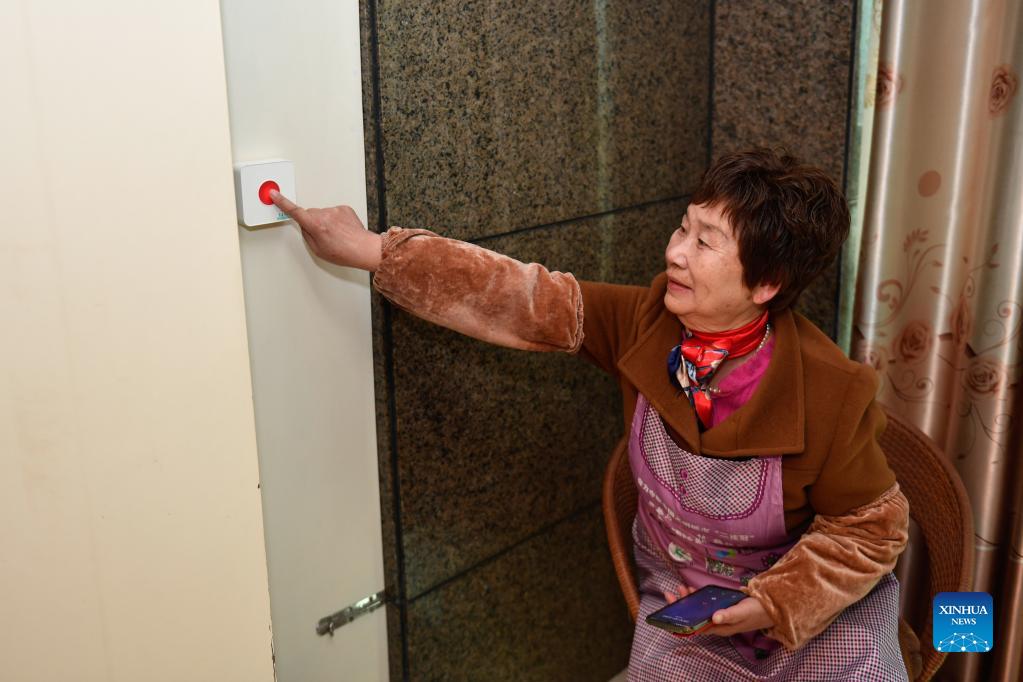Smart elderly care products, services improve senior citizens’ wellbeing in China
At 7 a.m., an elderly woman surnamed Sun who lives in a community in Changping district, Beijing, checked up on how her father was doing in their hometown via a video camera that she installed inside his home. Three hours later, Sun used an intelligent speaker to accompany her granddaughter while she listened to a children’s program. At noon, she gave a voice command to the same speaker to order some meals delivered from a nursing home in the community.

A senior citizen learns to use the newly installed "one-push-to-assistance" button at her residence in Aishan sub-district, Huzhou City of east China's Zhejiang Province, Nov. 17, 2021. When necessary, senior citizens may push the red buttons, and staff members would contact them for further information and arrange services as they need. This "one-push-to-assistance" system has covered all people of 70 years or older in this sub-district. (Xinhua/Huang Zongzhi)
Sun said that the intelligent speaker she bought in July 2020 has made her life more convenient. Now, over 200 senior citizens like Sun in the community use smart elderly care products and enjoy smart services.
The community where Sun lives is just one epitome of the rapid development of China’s smart health and elderly care industry.
In recent years, more and more intelligent products and services, emerging as a result of the accelerated application of a new generation of information technology, represented by the Internet of Things, big data, and artificial intelligence (AI), have made the country’s elderly care industry smarter and have improved the wellbeing of seniors.
A total of 118 smart health and elderly care products and 120 smart health and elderly care services were included in two recent catalogs jointly issued by the Ministry of Industry and Information Technology (MIIT), the Ministry of Civil Affairs (MCA), and the National Health Commission (NHC). The move has boosted the application of smart health and elderly care products across the country.
The MIIT, MCA and NHC have also carried out application pilot demonstrations, with 167 industrial leading enterprises, 297 model neighborhoods and 69 model bases for the smart health and elderly care industry.
Recently, the three government agencies issued an action plan to further develop the smart health and elderly care industry over the next four years to meet senior citizens’ multilevel and diverse needs.
According to the action plan, China will upgrade these smart health and elderly care products and services by making good use of information technology in order to offer more convenience to senior residents.
For example, at a nursing home in Xietang neighborhood, Suzhou, east China’s Jiangsu Province, millimeter wave radar technology has been applied to help seniors to resolve emergencies at any time.
In the past, some nursing homes installed “one-button” emergency call systems. If seniors needed help in the case of an emergency, they could press the button to inform the nursing staff. However, in some cases a senior citizen might be unable to press the button during an emergency situation.
After collaborating with a smart domestic hardware company, the nursing home started using the millimeter wave radar technology, which was previously applied in the self-driving sector, in order to provide an early warning system for potential emergencies, said Bu Jiangyong, founder of the nursing home.
Bu explained that the nursing home has deployed the technology to predict the trajectories of senior citizens and monitor their real-time heart rates, breathing and sleep quality.
Sun Qifeng, director of the China Electronics Standardization Institute, said that health and elderly care products are becoming smarter, thanks to the development of sensing, high-precision positioning, and health monitoring technologies, among other innovations.
Sun explained that an increasing number of smart terminal devices, such as health management wearables and health monitors, will benefit more and more elderly people.
Apart from smart hardware devices, some localities and enterprises have formed a long-term risk control model for the elderly and have offered more targeted elderly care services by integrating information received from the elderly, families and health care providers.
By taking advantage of new technologies such as big data and AI, Fengxian county in Jiangsu Province has launched intelligent applications for the elderly, enabling them to handle 11 items related to the retirement process in just one single submission of materials at the county’s human resources and social security bureau.
Photos
Related Stories
Copyright © 2021 People's Daily Online. All Rights Reserved.










